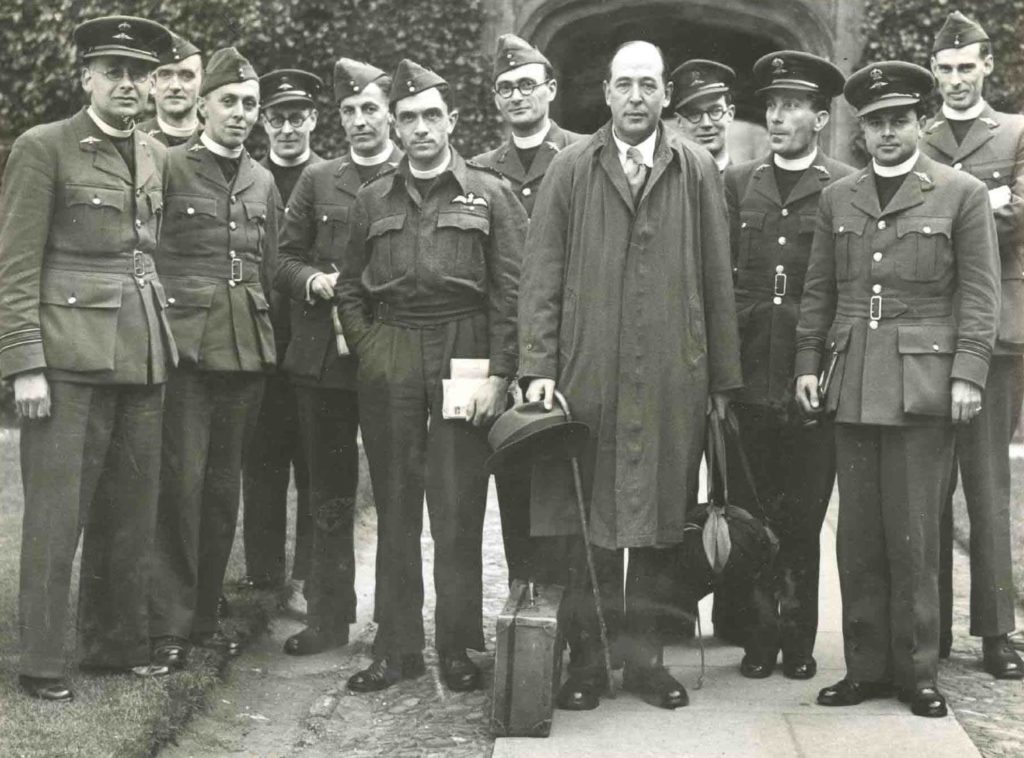Along with probably all, or nearly all, of my professorial colleagues in the US and in many other countries, I am homebound now, completing my courses remotely. Is this something that is important to do in light of the current global pandemic? Shouldn’t we perhaps just drop all this “learning stuff” and devote our whole selves to the “virus war”?
C. S. Lewis dealt with this same issue as WWII ramped up. Should the university continue teaching during the crisis? While the two situations are not identical, the principle seems to be the same. As Lewis noted at the time, “Even if we ourselves should happen not to be interrupted by death or military service, why should we-indeed how can we-continue to take an interest in these placid occupations when the lives of our friends and the liberties of Europe are in the balance? Is it not like fiddling while Rome burns?”
That question comes from a sermon Lewis delivered in 1939 that eventually was published as the essay “Learning in War-Time.” A few days ago, as I was contemplating what to write today, I had brought up that essay on my laptop, ready to comment on it. As if confirming my intent, the Wade Center at Wheaton posted a blog yesterday that not only recommended reading that essay in light of our present crisis, but the Center also posted this photo of Lewis meeting with RAF chaplains during WWII.

Lewis, as always, gets to the crux of the issue in this essay when he instructs,
The war creates no absolutely new situation; it simply aggravates the permanent human situation so that we can no longer ignore it. Human life has always been lived on the edge of a precipice. Human culture has always had to exist under the shadow of something infinitely more important than itself. If men had postponed the search for knowledge and beauty until they were secure, the search would never have begun. We are mistaken when we compare war with “normal life.” Life has never been normal.
We are now on the edge of a different precipice than Lewis faced, but a precipice it is, and others just like it have preceded it. Knowing something about history might be helpful—to offer credence for my particular subject—as we look at what’s happening right now. Although Lewis was not a historian, his acknowledgement of the historian’s craft and the need for it comes across boldly in this essay.

“Most of all, perhaps, we need intimate knowledge of the past,” Lewis opined. “Not that the past has any magic about it, but because we cannot study the future, and yet need some thing to set against the present, to remind us that the basic assumptions have been quite different in different periods and that much which seems certain to the uneducated is merely temporary fashion.”
In other words, we need perspective, and knowledge of the past can provide a perspective that might be helpful today. It can keep us from being too narrow in our understanding of what is occurring. “A man who has lived in many places is not likely to be deceived by the local errors of his native village; the scholar has lived in many times and is therefore in some degree immune from the great cataract of nonsense that pours from the press and the microphone of his own age.”
By the way, there has been no lessening of “the great cataract of nonsense” in our day. In fact, with the addition of cable news, the internet, and social media, nonsense has become more omnipresent than ever. My job as a professor of history, culture, and government is to guide students into discernment of what is sensible and what is, indeed, nonsense. My specific goal, as a Christian, is to provide a Biblical context for all that they read and study.
Consequently, I believe my “job,” (a.k.a., my ministry) is important, perhaps even more so as society faces a deadly menace. Lewis again: “Good philosophy must exist, if for no other reason, because bad philosophy needs to be answered.”
What matters most of all, of course, is eternity, because the one thing every person will face is death. Lewis put it succinctly in this way: “But there is no question of death or life for any of us, only a question of this death or of that-of a machine gun bullet now or a cancer forty years later. What does war do to death? It certainly does not make it more frequent; 100 percent of us die, and the percentage cannot be increased.”
For Lewis, war was making death more real to his generation; today, it is a virus. Yet being more aware of our mortality, he muses, is what great Christians of all eras have regarded as a blessing. Why? It tears away the false hopes we have about this world. He concludes with these words of wisdom:
If we had foolish un-Christian hopes about human culture, they are now shattered. If we thought we were building up a heaven on earth, if we looked for something that would turn the present world from a place of pilgrimage into a permanent city satisfying the soul of man, we are disillusioned, and not a moment too soon.
Christians, in our “virus war,” should be taking the lead in reminding our neighbors that no matter what happens in this current crisis, this world will never satisfy our souls. We need to face up to that fact and get serious about sin, repentance, faith, forgiveness, and a relationship with God that will stretch out into eternity. Only in that will our souls find true satisfaction.
